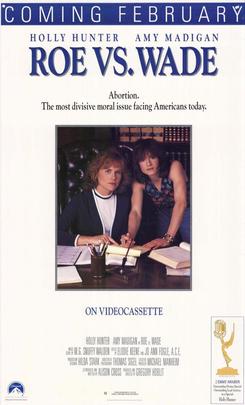| Roe vs. Wade | |
|---|---|
 VHS release promotion | |
| Genre | Biography Drama |
| Written by | Alison Cross |
| Directed by | Gregory Hoblit |
| Starring | Holly Hunter Amy Madigan |
| Music by | W. G. Snuffy Walden |
| Country of origin | United States |
| Original language | English |
| Production | |
| Producers | Gregory Hoblit Alison Cross Michael Manheim |
| Cinematography | Newton Thomas Sigel |
| Editors | Joe Ann Fogle Elodie Keene |
| Running time | 100 minutes |
| Production companies | NBC Productions The Manheim Company |
| Original release | |
| Network | NBC |
| Release | May 15, 1989 |
Roe vs. Wade is a 1989 television film directed by Gregory Hoblit about the landmark 1973 United States Supreme Court decision Roe v. Wade . It was written by Alison Cross and stars Holly Hunter and Amy Madigan.